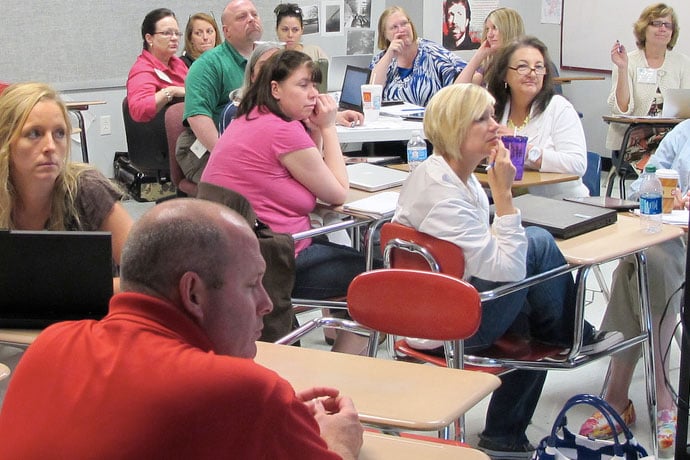First, this essay is not intended to wade into the pros and cons of the Common Core standards used in the United States. As a parent, and a liberal and Luddite, the standards concern me on several levels. But, as you’ll see, my opinions are not relevant to the point of this essay.
Raising two great fun kids, I’ve always been interested in how they learn and how their teachers teach in the classroom. I had lots of fun, for example, as a parent teacher when our kids were in kindergarten through fifth grade. Each school year the teachers would let us in the classroom to teach 4-5 one-hour sessions about science and art, usually a short presentation then working with kids on projects. The art lessons came from a thick binder with CDs that included a lesson plan and worksheets for the kids, for example.
When I first heard about Common Core, from a teacher, I didn’t pay much attention. I trust teachers and schools to vet what they teach. When teachers started to complain to me about how the standards restricted what they taught and, worse, required weeks of teaching to a test for all grades, including our kids, I got interested.
I still have not found out exactly who created the Common Core standards, one point of this essay. I’ve heard it was one individual with no classroom experience funded by the Gates foundation. I’ve also read, somewhere, it was a group effort with teachers and others.
To publish this magazine, I use the Computer Science Teacher’s Association (CSTA) curriculum as a guide to find stories to write about and ensure each issue covers most of their guidelines. For example, it’s not enough to teach coding or computer science concepts. It’s also important to help kids learn about choosing technology, the global impacts of technology, problem solving skills, and other subjects. As a dad and a liberal who believes in the power of families and communities, I also like the CSTA (and ISTE) curricula were created in a way that is open and accountable.
I’ve also used a lot of open source software in my professional career, and made lots of money helping people use open source software. I like giving back to these communities whenever possible.
Which leads to my question: if Common Core is such a problem, what prevents teachers, principals, parents, and professionals from either open sourcing Common Core or creating an alternative standard?
Best practices for creating and sustaining open source projects and communities are well known by now. And from personal experience there are thousands if not tens of thousands and hundreds of thousands of teachers who care a lot about what they teach in their classrooms. I hear there are lazy incompetent teachers but, honestly, while living in three US states and sending our kids to public schools, I’ve never met one while dealing with dozens of teachers who have taught our kids. They all work evenings and weekends and spend their money on classroom supplies.
One critique I’ve heard about Common Core, for example, is that the test questions for first graders are inappropriate for their mental skills at their age. If true, surely first grade teachers could work together to create an age appropriate curriculum for their kids?
And if over-testing is a problem, surely teachers, principals, parents, and professionals could include appropriate grades for testing as part of an open source curriculum? For example, if tests are appropriate for kindergarten, first grade, fourth grade, and eighth grades, ensure the curriculum for non-tested years build and repeat knowledge to support the next test. An open source curriculum also could take into account how teachers work best together for professional development and with their students in a classroom.
And if money is a problem, surely there are foundations which would support an open source curriculum effort, as well as an ongoing community? Universities also could support such an effort, and likely should to ensure fairness for all interested parties.
The technology and expertise exist to open source a basic curriculum standard for US schools, or any schools in the world. And surely I’m not the first person to make this suggestion.
An open source curriculum would build our education system around the common wisdom of teachers who teach in classrooms, principals who guide their teachers, parents who want kids who grow up well-rounded and empathetic, and communities that want kids who are happy, productive, and give back to their communities. Tests and classroom practices would be built on that foundation, not be the foundation.
The open source software community has shown the power of individuals working together to solve common problems with technology. If the Common Core curriculum and over-testing are real problems, perhaps individuals should work together to create a viable alternative curriculum.
Learn More
The Cathedral and the Bazaar
Eric S. Raymond’s essay (later a book) about how open source software development works in theory and practice.
http://www.catb.org/~esr/writings/cathedral-bazaar/cathedral-bazaar/
http://www.catb.org/esr/writings/cathedral-bazaar/
http://shop.oreilly.com/product/9780596001087.do
http://en.wikipedia.org/wiki/The_Cathedral_and_the_Bazaar
How to Build an Open Source Community
http://oss-watch.ac.uk/resources/howtobuildcommunity
CSTA K-12 Curriculum Standards
The How to Use the CSTA Standards section at bottom lists the group that developed their computer science curriculum.
http://csta.acm.org/Curriculum/sub/K12Standards.html

